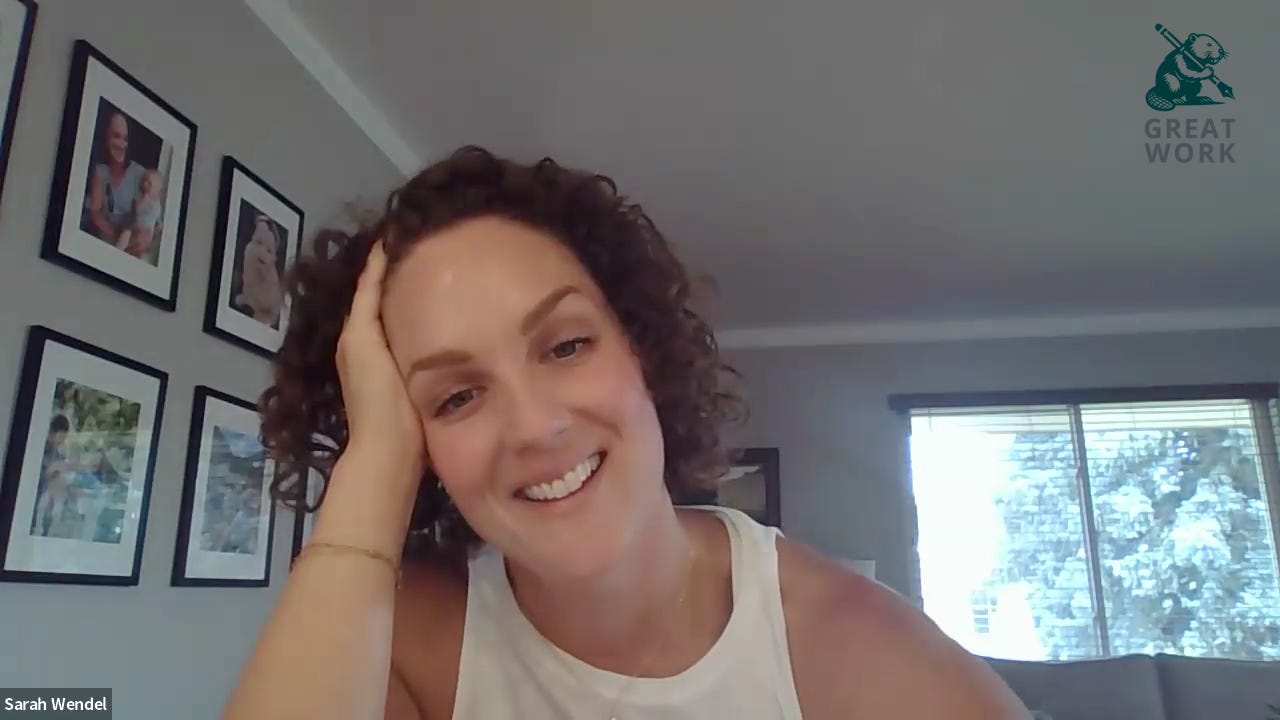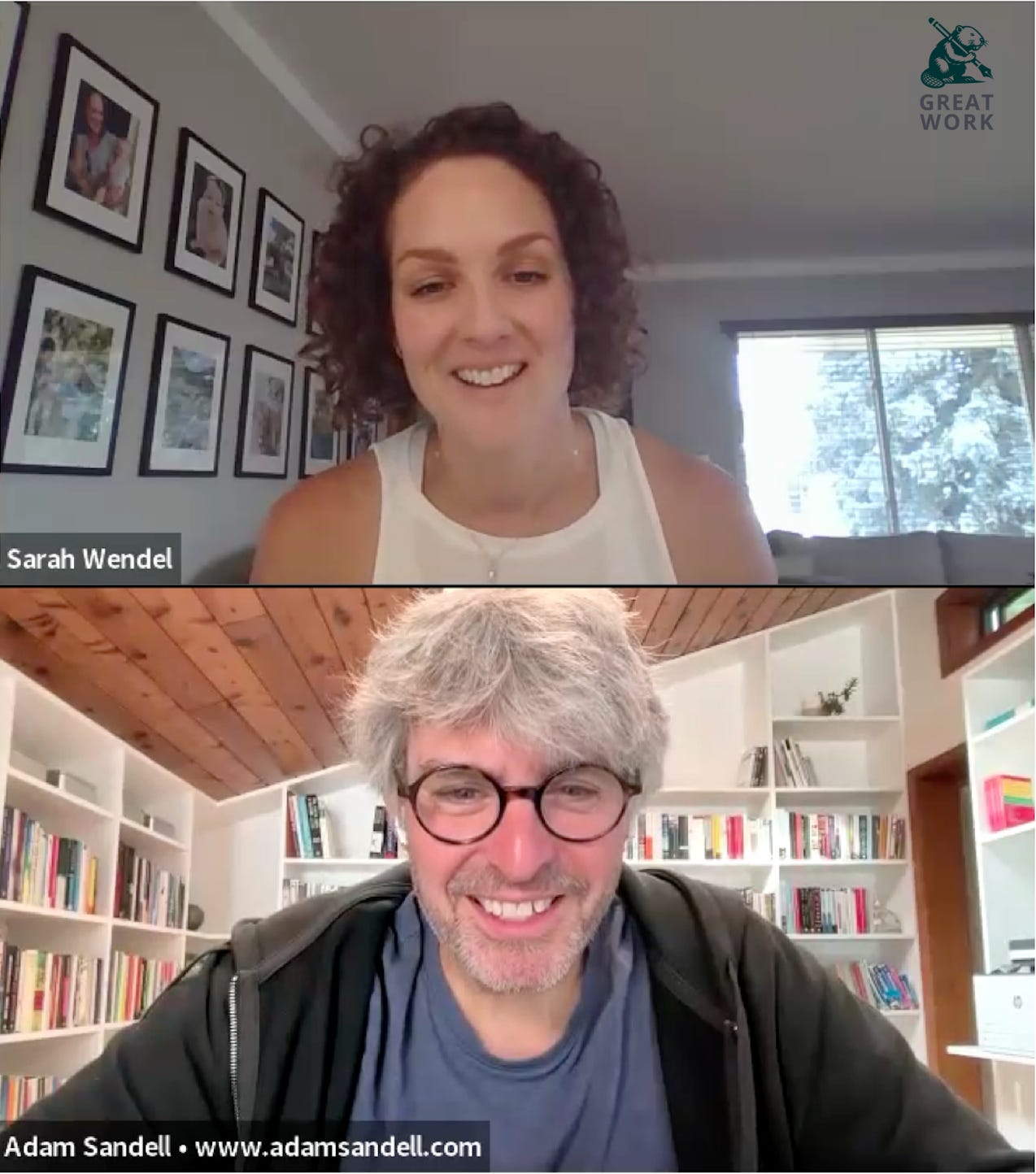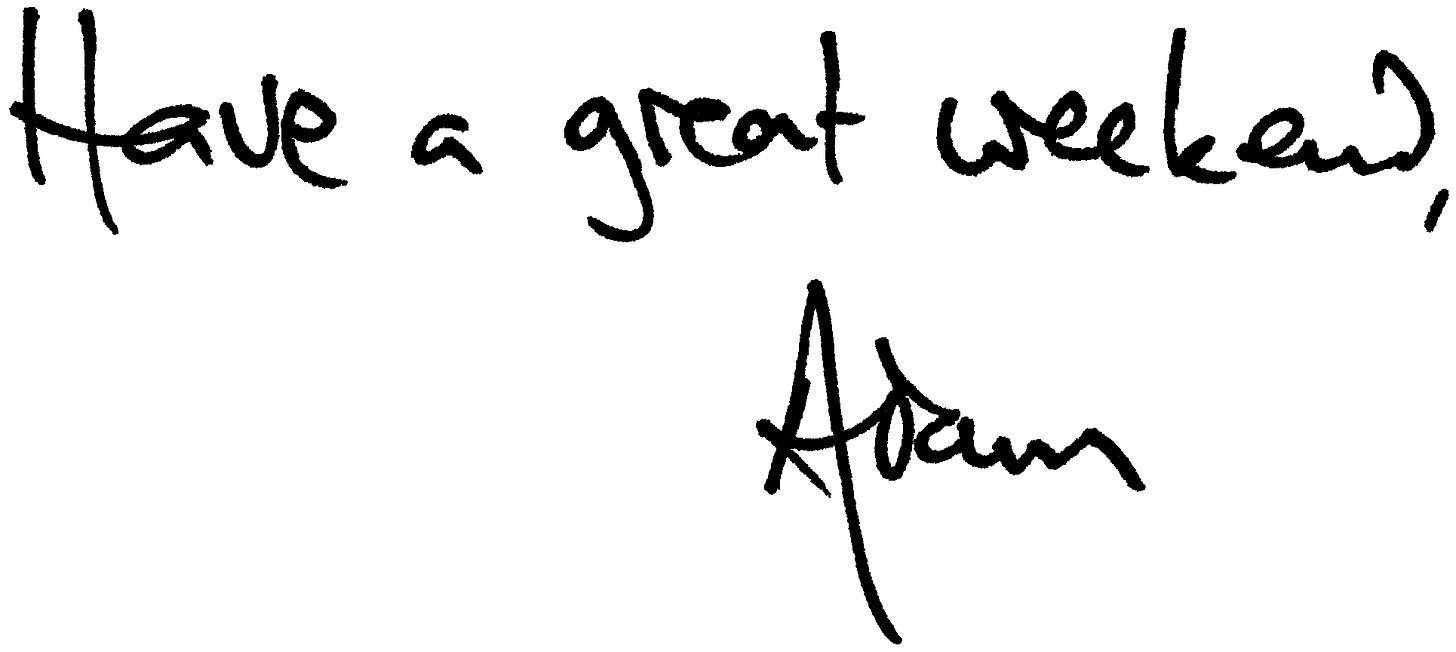Lessons about Work from Middle-School Teacher
The audio version’s been professionally edited this time, with music and everything—give it a listen above, or as a podcast on Apple Podcasts, YouTube, or Spotify.
Working as a GP you soon learn that, if a teacher’s made an appointment with you, more often than not it’ll be for something stress-related.
This means that there’s a lot the rest of us can learn from teachers who’ve figured out how to navigate their working lives without giving it all up to become florists.
And in this email I’m going to share some of that learning from Sarah Wendel. Sarah’s a mid-career middle-school teacher in Colorado, a parent, and a Great Work reader.
Sarah’s the kind of teacher you’d want to have, the teacher you’d want your kids to have. She’s no braggart but, talking to her, I’m a little overwhelmed by how much she cares. She’s excited by ideas. And she gives herself to her students—yet has also learned how to take care of herself and ensure her family doesn’t pay too high a price, too.
So what can we learn from her? Here are four of Sarah’s strategies.
Lesson 1: Boundaries at work
“I’m a real empath, and that’s a blessing and a curse. I wear my heart on my sleeve. And that makes me a great teacher, because students see that, and it makes me a really great relationship-builder with them. But because I’ve been doing it for a while, I’ve learned that I have to really set boundaries with them, because they take advantage of it because they’re teenagers. I’ve made mistakes, of course, where they’ve taken advantage of me and my vulnerability.”
Great Work is for people who care about their work. It’d be so much easier not to give a shit—but how meaningless would your work then be?
Giving a shit, though, comes with a cost: vulnerability. And a second cost: we may find boundaries harder to set. We value those connections. We’re keen to help. We need to feel needed.
What boundaries you need depends on the work you do. For Sarah it might include censoring, with her teenage students, some of the emotions she’d reveal to others. For me, a doctor, it sometimes means prioritizing what I can do for patients medically, remembering my limits when things start straying into social work, mentoring, relationship therapy, non-medical advocacy, or other realms. In fact, if you work with marginalized communities (whatever your role) and you give a shit, you end up doing little bits of all of those things and more. And, in a rural setting, you can’t help having students or patients who are also friends, neighbors, and colleagues. The trick is to be aware of what’s going on, and of the power imbalance, and to set (and sometimes discuss) sensible boundaries.
You learn to set boundaries by doing the job, making mistakes, and figuring out where your boundaries need to be. Yours, Sarah’s, and mine will all be drawn a little differently, and that’s fine. Those who run into difficulties are those who don’t think “Where should my boundary be?” in this role, or with this person, or in this interaction.
Lesson 2: Boundaries around work
How easy do you find it to switch from work to non-work?
Some people can flip a switch as they finish work for the day or the week. Others—including me and, it turns out, Sarah—can ruminate on some work problem all evening, and through the night, when we should be relaxing, spending time with people we love, doing things we enjoy, or sleeping.
“And so usually after school I have some time before I pick my kids up where I will run errands or I’ll go to an appointment or do something that kind of gives me some cushion instead of just walk out my school door, drive down the street and go get my kids. But I need a little bit of cushion time to transition from my workday to turning on mom mode.”
I’ll sometimes meditate for a few minutes after a heavy day, to clear my mind and reset for the evening. Too tree-hugging for some, meditation works for me.
Then there’s work intruding outside of work. “I’ve always been pretty good about not bringing my work home with me,” Sarah says.
“Like physically, I will leave my computer at school, because most of my stuff’s digital. The tricky part is the mental stuff, like if I get an email. I really try not to check my work email once I get home. That’s when I get my chance to deal with my own children’s stuff is when I’m done with work. And so if that’s when I get an email, I just perseverate and I have a hard time putting an end to that unless I deal with it, or respond, or whatever, and then I can move on. I have to close the door on work, metaphorically and physically, and not look at my work email. If I don’t have my computer then I can’t do any of my computer stuff. And then I can just be fully present.”
Leave your work computer at work, if that’s how work works for you, and make it hard to check your work email. (Could Sarah take her work email off her phone, or get a separate work phone, or somehow make it harder to check her work email when away from work? It’s when you’re most stressed that you’re most likely to check, seeking—but perhaps not getting—reassurance that there’s nothing there.)
Lessons: think about how you switch over at the end of the day, shelving work and immersing yourself in whatever you want to be immersed in. And do what you can to prevent work from intruding: practical solutions like Sarah leaving her work laptop at school, or technological solutions like setting your phone to block work texts out-of-hours.
Lesson 3: Humility’s helpful. Imposter symptoms aren’t.
When Sarah first began teaching, she was working with a predominantly Latino/Latina population. “I was a minority in my own classroom, and I had never had that experience before.” And this was on top of being new to teaching.
“For most, really all of my life I’ve been surrounded by people who look like me, and who were like me, and came from a world very much like me. I distinctly remember my first couple of years of teaching, there were moments that were very, very challenging.”
And so here she is, right at the beginning of her career, and she’s experiencing the imposter syndrome. But that wasn’t because of inexperience, she explained. It was because she was white.
And of course Sarah was right to recognize her limits: she was trying to help kids grow into wiser, more adult versions of themselves when she didn’t have the expertise to fully understand what that meant.
But if you do work that matters, you’re always going to be able to find reasons to believe that you’re not up to the job facing you. And that humility will make you better at whatever it is you do. You’ll reflect on what you can do. You won’t pronounce on or do things when you really shouldn’t. And you’ll speak to others as equals, not from on high.
“And I’m so thankful that I did have that because I really believe it made me a better teacher and educator because of that experience.”
As I’ve written about before, imposter symptoms commonly derive from three beliefs: that you’re not as good as everyone else, that you’re not up to the task facing you, and that something awful’s going to happen as a result. Those three beliefs are almost always objectively false. Sarah wasn’t a member of the marginalized ethnic groups she was teaching: true. But it sounds like she was up to the job nonetheless. And nothing awful happened. In fact, it ended up being a good experience: she learned from it.
Fix the false beliefs and you fix that horrible feeling of being dangerously out of your depth. Humility’s good. Imposter symptoms aren’t.
For more on the cognitive-behavioral therapy approach to imposter symptoms that actually fixes it:
Lesson 4: Repair conversations
Previous emails have been about the importance of good working relationships and why we should, and how we can, have difficult conversations.
How do you fix bad feeling? Sarah has a lovely term for this:
“And there might be some lingering stuff like if I had a bad interaction with a kid. Those are things that I might perseverate on and think about how I could have done something differently. I will often have a repair conversation with a kid the next day, once I’m in a better place, and they’re in a better place, if I didn’t do it that day at school. And so I think about that kind of stuff.”
Repair conversation. I love (and will be stealing!) that expression.
But there’s another point here: it’s the evening and you’re worrying about some difficult exchange you had with someone at work. Ok, you can tell yourself, tomorrow, when the moment’s right, I will have a repair conversation. Now shelve that, and enjoy the evening.
Talking to Sarah I had the sense that, from her perspective, she’s still grappling with how best to navigate her tough working life. I think that’s how this seems to most of us. It does to me. But, whether or not it feels to Sarah like she’s nailed it, she’s figured out a lot. And it makes me feel better about the future of the world to know that there are teachers out there like Sarah, navigating their working lives, preparing their students to navigate theirs.
PS Do you have a story you might be willing to share about navigating tough work that matters to you? Reply and it’ll come straight to me.
Have you, through some terrible oversight, not joined this community of people who do tough work that matters? Sign up! It’s free, bullshit-free, and not selling anything.
And, if you found this useful, do send it to others who might too. Thank you!
Big thanks to Sarah Wendel for the great conversation and for being up for this, and to Bren Russell for editing the podcast version.







